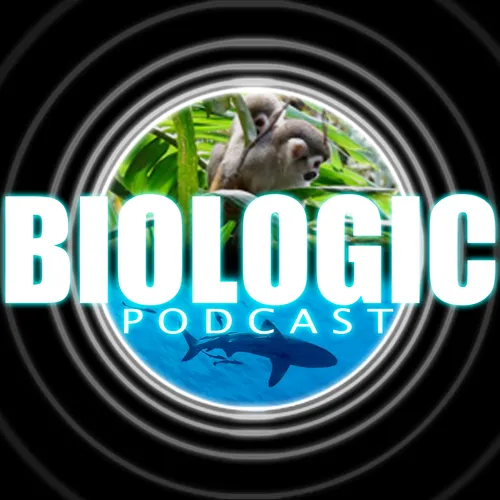
The Biologic Podcast
Welcome to the Biologic Podcast, an audio exploration of the incredible world of living things.
The journey begins at the dawn of life, almost 4 billion years ago. In this ancient eon, biochemical reactions gave rise to ordered systems (the cell) capable of replication. The key to this replication is the genome, and the DNA itself.
At this point, the journey expands in scope; we will explore the process of evolution, then move through hundreds of millions of years of evolutionary history until we come to the modern day, to survey the modern world's biodiversity. Then we'll take a step back to look at the ecological interactions of all this life, and the resulting biomes that define the surface of our planet Earth.
Our journey through the biological realm takes a sudden turn; having learned about life at the grandest scale, we now return to the ground, to look in greater detail at the various organisms that share this world with us. We first explore the physiology & diversity of plants, and then same for the fungi. Moving from flora to fauna, we explore the physiology & diversity of animals, up to and including the human being.
The path is long and the lessons hard, but for the ever-curious listener, there are many great discoveries and insights to be had in the world of the biological.
- Update frequency
- every 17 days
- Average duration
- 43 minutes
- Episodes
- 123
- Years Active
- 2019 - 2025

Episode 23 - Phylogenetics
As all living things are fundamentally related, phylogenetics is the study of these genetic relationships, and the evolutionary history of the many diverse lineages of Earthly life.

Episode 22 - Divergence & Speciation
When populations groups diverge, whether they're separated geographically, temporally, or behaviorally, they find themselves on the pathway to speciation.

Episode 21 - Mechanisms of Evolution
Besides natural selection, evolution is influenced by mechanisms like gene flow, the random walk of genetic drift, and the novelty-generating phenomenon of genetic mutations.

Episode 20 - Natural Selection
The forces of natural selection remove from the gene pool those lineages too unfit to survive in a given habitat, while those with good health survive to make healthy offspring, and their lineages te…

Episode 19 - Introduction to Evolution
A brief introduction to evolution, including its mechanisms, selective pressures, runaway effects, and the fundamental importance of evolution as a guiding force for the perpetuation of life.

Episode 18 - Gene Modification
Genetic information is complex; there's the gene sequence, the regulation of gene expression, and there are even mechanisms to modify genes, allowing a single gene to produce multiple different prote…

Episode 17 - Gene Expression
The gene itself encodes raw information, but this is just the beginning of gene expression, which is a complex, highly-regulated, and tightly-coordinated process.

Episode 16 - DNA Synthesis & Repair
New DNA molecules are generated through a complex replication process, and mutations can be repaired with a variety of mechanisms.

Episode 15 - Transcription & Translation
The genome encodes information to 'build' the organism; the process of transcription encodes the DNA information into RNA, and translation encodes the information into polypeptide chains, which form …

Episode 14 - Meiosis
Meiosis is a specialized form of cellular replication, which creates many haploid daughter cells, each possessing a single copy of the genome.

Episode 13 - Introduction to Genetics
A brief introduction to genetics, including the structure of DNA and RNA, gene expression, genome replication, and more.

Episode 12 - The Cell Cycle
As organisms a born, grow, reproduce, and die, so too do cells. The cell cycle is the pattern of cellular growth & replication that sustains life.

Episode 11 - Inter-Cell Relationships
The cell is one among many; all cells in a tissue, or an organ, or an organism, have relationships with other cells, and these relationships help to sustain life.

Episode 10 - Cellular Respiration
Cellular respiration is a perpetual cycle of energy generation that sustains not just the cell, but the life of the organism it's a part of.

Episode 9 - Metabolic Energy & Enzymes
Enzymes are among several diverse groups of chemicals that participate in the metabolic pathways that keep the cell alive.

Episode 8 - Cellular Subsystems
The cell perpetuates itself with a variety of organelles, metabolic pathways, and biochemical subsystems.

Episode 7 - Introduction to the Cell
A brief introduction to the cell, including its structure, physiology, metabolism, and replication.

Episode 6 - Membranes & Lipids
The lipids are fundamental building blocks of life, as they can store energy for the long-term, and they compose the cellular membrane.

Episode 5 - Carbohydrates
The carbohydrates are carbon-rich molecules that can do many things, from storing energy, to supplying carbon atoms for molecular synthesis.

Episode 4 - Nucleic Acids
The nucleic acids are fundamental building blocks of life, forming the basis for countless derivative compounds, and the monomers of DNA.